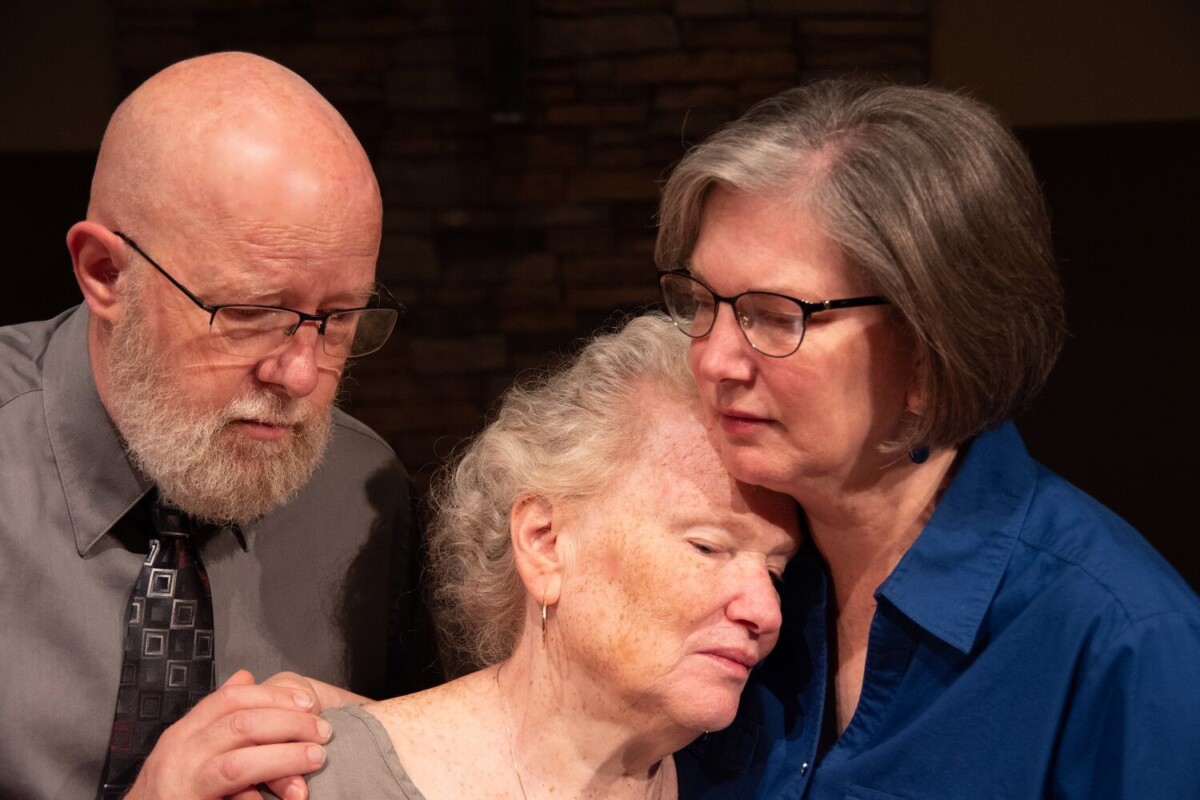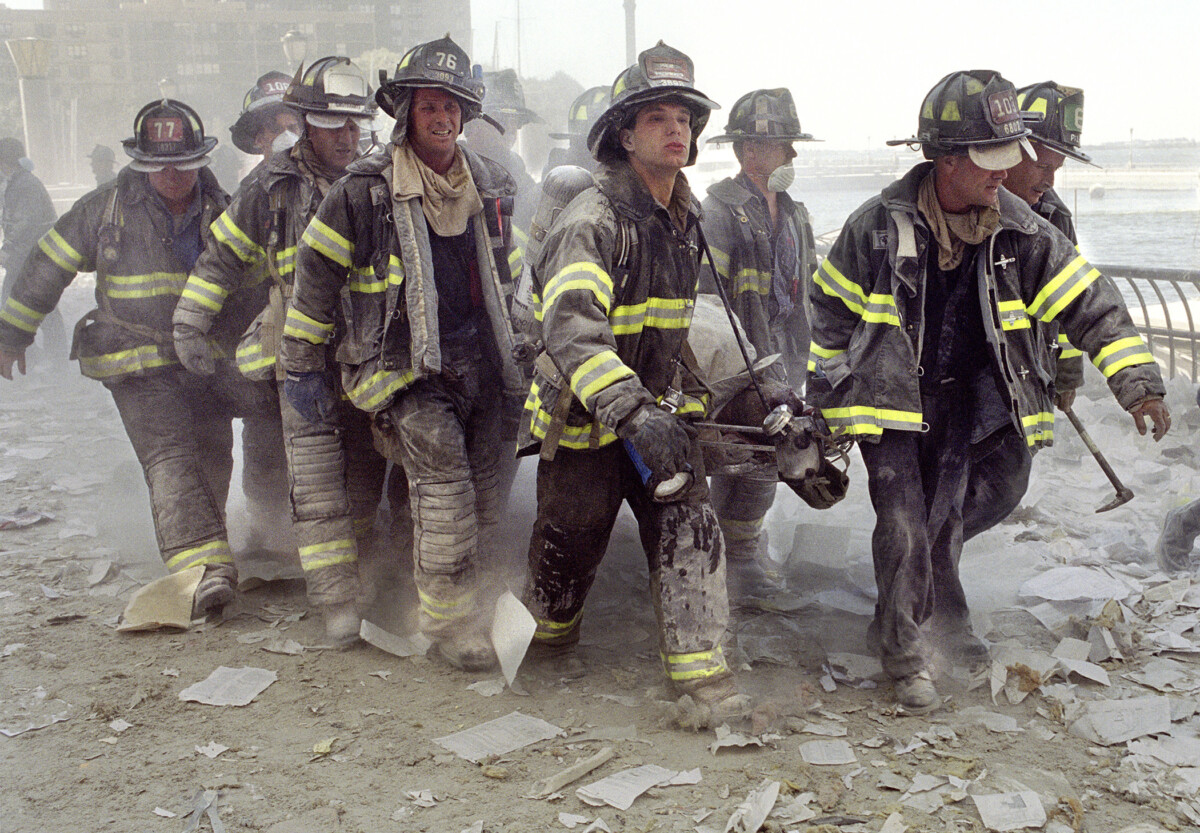To commemorate the twentieth anniversary of 9/11, my church hosted two special performances of the play September Bears, written and directed by Jeff Barker. The last time I saw the play was nearly eighteen years ago, in March of 2003 when the Northwestern College drama ministries ensemble performed it, while on tour, in the first congregation I served.
I was two years out of seminary and pretty much clueless as to how to lead a congregation through the pain of a national tragedy. September Bears was such a gift to our church. It helped us name our grief in community (which we weren’t very good at) and to choose hope and compassion over the rising tide of hate and fear.
Jeff’s play moved me the first time I saw it all those years ago, but it moved me even more when I saw it again this past September. I found myself weeping on and off throughout the entire thing. It surprised me, this strong emotional response. Why so many tears, I wondered. What’s this burst of grief all about?

September Bears tells the story of a school teacher named Sue Lucarelli and her little church, Community Reformed Church of Manhasset on Long Island, New York. In the aftermath of the terrorist attacks on the World Trade Center, Sue struggled with how to help her students work through their collective trauma. Nearly everyone in their community lost someone or knew someone who lost someone. Days and weeks after the tragedy, whenever the children would hear the roar of jet engines, they’d cower under their desks in fear. So she gave them teddy bears to hold in class to help comfort them and to focus their attention. Soon, every student in the school wanted a teddy bear to hug and hold. And Sue’s church found a way to do it. The word got out, and every school in the city wanted teddy bears for their students too. With the help of other churches and people across the U.S., Sue and her church managed to place bears into the arms of every child. Teddy bears arrived in truck loads, from as far as the west coast, with notes of encouragement and bible verses and heart-felt prayers.
It’s such a beautiful story of a small church seeking the welfare of their community, embodying the love of Jesus Christ through something as tangible as teddy bears. The cast of September Bears did a wonderful job, and you can watch it here on YouTube.
But back to my question: Why did I have such a strong emotional response when I saw the play again a few weeks ago? I’ve had some time to reflect on this, and here’s what I came up with. Three things.
First, I was moved by a picture of people (strangers, in fact) moving toward one another with kindness and compassion. It wasn’t just about the teddy bears. It was also the hundreds of other mundane acts: people handing out water bottles, strangers embracing each other, firefighters covered in chalky ash as they dug through rubble. It reminded me of the beauty of what can happen (and should happen) when we face a national and global crisis—how our pain and loss has the capacity to bring us together rather than drive us apart. September Bears reached into a tender place in my own heart—a place of longing and lament for what hasn’t happened over the past eighteen months with the global pandemic. I ask myself: How’d we miss this opportunity? And Is it too late for us to change?

Second, I found myself grieving for my denomination, the Reformed Church in America. In less than two weeks, I will join several hundred leaders and delegates in Tucson, Arizona for our annual gathering (General Synod). So much about the RCA’s future remains uncertain. A number of churches have already decided to leave. Sitting in front of me, as I watched September Bears, were some pastors and church members from other area churches. People I love. And I cried. It dawned on me that September Bears isn’t just the story of Community Reformed Church of Manhasset. This is our story. Our story as a denomination. Teddy bears were sent from RCA churches (and other churches) all over the country—Michigan, Iowa, Missouri, California. It wasn’t about who was “conservative” and who was “liberal,” who was on “this side” and who was on “that side.” No, here was moment when people were in pain, a nation was reeling in pain, and this little denomination called the RCA (led by Community Reformed of Manhasset) bravely entered into that place of pain with a gospel presence. Have we forgotten who we are? Have we forgotten our story?
Third, watching September Bears reminded me of the incredible power of art, of good storytelling, and what happens when the local church can be a place where the arts are nurtured and lifted up. I was present to how much we need our artists in this moment–as a denomination, as a broader church, and as a society. I think I wept because I realized that Jeff and Karen Barker, my mentors and friends, are part of a generation of artists for the church who have labored faithfully for so long, and now they take a bow for their final curtain call as they transition into retirement. And I wonder: Who will rise up in their place? Who are the next generation of artists to take up the mantle and employ their art in service to the church and for the sake of the world? Who will help us name our pain and inspire us with hope and help us find our way forward? (I know you’re out there, and you know who you are! We need you right now!)
“When people cease to be surrounded by beauty, they cease to hope,” N.T. Wright writes in his book Surprised by Hope. “Part of the role of the church in the past was—and could and should be again—to foster and sustain lives of beauty and aesthetic meaning at every level, from music making in the village pub to drama in the local primary school….The church, because it is the family that believes in hope for a new creation, should be the place in every town and village, where new creativity bursts forth for the whole community, pointing to the hope that, like all beauty, always comes as a surprise,” (pp. 231-32).
Thank you, Jeff and Karen Barker, for carrying this vision in your bones for so long. And thank you, Jeff, for writing September Bears. It was the right story for us then; and I believe it is the right story for us now, eighteen years later.


